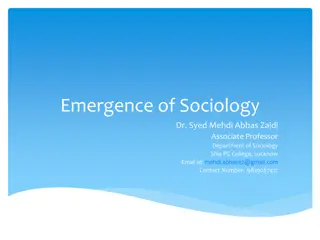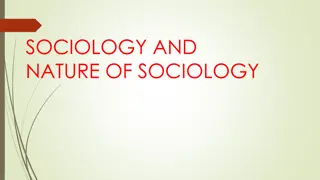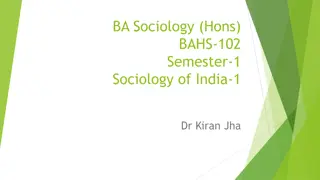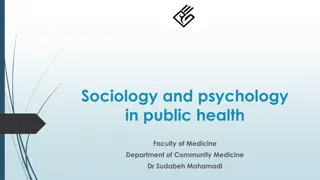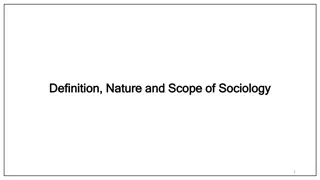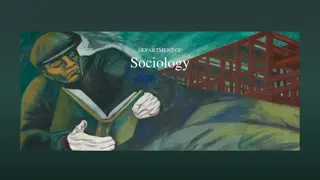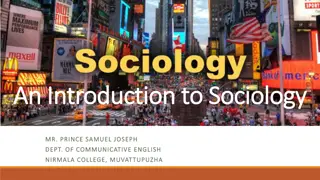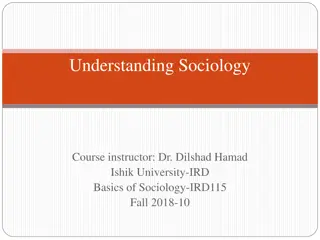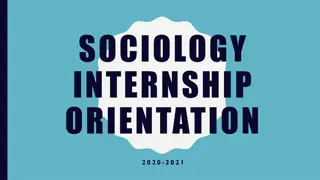Exploring Sociology: A Comprehensive Overview
Sociology is a science that delves deep into the study of society, its structure, and dynamics. From its historical roots to modern contributions, this discipline provides insights into social relationships, institutions, and the impact of society on individuals. By understanding human behavior within the social context, sociology enhances our knowledge of social interactions and empowers us to lead effective social lives.
Download Presentation

Please find below an Image/Link to download the presentation.
The content on the website is provided AS IS for your information and personal use only. It may not be sold, licensed, or shared on other websites without obtaining consent from the author. Download presentation by click this link. If you encounter any issues during the download, it is possible that the publisher has removed the file from their server.
E N D
Presentation Transcript
Introduction to Sociology By DR. SAREER KHAN
Chapter No. 01 INTRODUCTION TO SOCIOLOGY
Sociology is derived from Two words Latin word-- Socius Association/ Companionship Greek work----Logos -- Science/ Study Introduction to Sociology
Sociology is define by different Sociologists Auguste Comte: The study of Society. Max Weber: The study of Social actions. Emile Durkheim: the study of Social facts through Social institutions. Introduction to Sociology
Founder of Sociology Real Founder: Ibne-Khaldun Modern Founder: Auguste Comte Introduction to Sociology
In all ages and human times ever since out erect and restless species appeared upon the planet, men have been living with others of their kind in something called societies. Prior to the emergence of sociology the study of society was carried on in an unscientific manner and society had never been the central concern of any science. It is through the study of sociology that the truly scientific study of the society has been possible. Sociology alone studies social relationships, society itself. Sociology is interested in social relationships not because they are economic or political or religious or legal but because they are at the same time social Importance Of Sociology
Sociology studies society in a scientific way Before the emergence of sociology there was no systematic and scientific attempt to study human society with all its complexities. Sociology has made it possible to study society in a scientific manner. This scientific knowledge about human society is needed in order to achieve progress in various fields. Sociology throws more light on the social nature of man Sociology delves deep into the social nature of man. It tells us why man is a social animal, why he lives in a group, communities and societies. It examines the relationship between individual and society, the impact of society on man and other matters.
Sociology increases the power of social action The science of society assists an individual to understand himself, his capacities, talents and limitations. It enables him to adjust himself to the environment. Knowledge of society, social groups, social institutions, associations, their functions etc. helps us to lead an effective social life.
Sociology studies role of the institutions in the development of the individuals It is through sociology that scientific study of the great social institutions and the relation of the individual to each is being made. The home and family, the school and education, the church and religion, the state and government, industry and work, the community and association, these are institutions through which society functions. Sociology studies these institutions and their role in the development of the individual and suggests suitable measures for strengthening them with a view to enable them to serve the individual better.
Study of sociology is responsible for understanding and planning of society Society is a complex phenomenon with a multitude of intricacies. It is impossible to understand and solve its numerous problems without support of sociology. It is rightly said that we cannot understand and mend society without any knowledge of its mechanism and construction. Without the investigation carried out by sociology no real effective social planning would be possible. It helps us to determine the most efficient means for reaching the goals agreed upon. A certain amount of knowledge about society is necessary before any social policies can be carried out.
Sociology is of great importance in the solution of social problems The present world is suffering from many problems that can be solved through scientific study of the society. It is the task of sociology to study the social problems through the methods of scientific research and to find out solution to them. The scientific study of human affairs will ultimately provide the body of knowledge and principles that will enable us to control the conditions of social life and improve them.
Sociology has drawn our attention to the intrinsic worth and dignity of man Sociology has been instrumental in changing our attitude towards human beings. In a specialized society we are all limited as to the amount of the whole organization and culture that we can experience directly. We can hardly know the people of other areas intimately. In order to have insight into and appreciation of the motives by which others live and the conditions under which they exist knowledge of sociology is essential.
Sociology has changed our outlook with regard to the problems of crime It is through the study of sociology that our whole outlook on various aspects of crime has change. The criminals are now treated as human beings suffering from mental deficiencies and efforts are accordingly made to rehabilitate them as useful members of the society.
Sociology is of great importance in the solution of international problems The progress made by physical sciences has brought the nations of the world nearer to each other. But in the social field the world has been left behind by the revolutionary progress of the science. The world is divided politically giving rise to stress and conflict. Men have failed to bring in peace. Sociology can help us in understanding the underlying causes and tensions.
Scope of sociology In the field of knowledge In the field of profession Scope in the field of knowledge: Society is the web of social institutions and all these institutions are interrelated and interlinked with each others. Sociologists have the basic and primary objective is to buildup knowledge about the society and social interaction. Sociologistarerequiredtogaintheknow- howaboutthesocialproblemsandtheirsolutions. The specialized fields of sociology which give knowledge to the students of sociology about different aspects of human social life.
The Specialized fields of sociology Principles of Sociology Rural Sociology Urban Sociology Medical Sociology Criminology Social Psychology Economic Sociology Sociology of Religion Industrial Sociology Sociology of Social Problems Sociology of Education Political Sociology Sociology of the Family
In the field of profession Teaching Research Administration Social work Profession in the field of Medicine, Law & Engineering Civil Service Position Embassies Government Agencies
Relationship of Sociology with other social sciences: Sociology Sociology joined the family of social sciences relatively at a later stage i.e. in the 19th century, for it had no independent existence before. In fact, sociology began to emerge as an independent and separate discipline only around the middle of the 19th century. It took almost fifty years before the subject began to assume scientific character that it has today. Prior to the middle of the 18th century, the study of society was dominated by social philosophers rather than by social social scientists. These philosophers were less concerned about what society actually like, than what they thought it ought to be like. But in a relatively short period this emphasis was completely reversed. Hence study of society became more scientific than philosophical.
Psychology Psychology is the science of human behavior. This science, more than any other social science, focuses on the individual. Psychology shares one major field of interest with sociology, namely social psychology. Social psychology is the science of the behavior of the individual in society. It studies the way in which personality and behavior are influenced by the social context.
Economics Economics studies the production, distribution and consumption of goods and services. Wealth constitutes the central problem of economics. It studies man as a wealth-getter and wealth-disposer. Economics is in many ways the most advanced of the social sciences. Its subject- matter is often more easily measured than that of the order disciplines. But the economy is also a part of society; goods and services do not produce, distribute and consume themselves. The economic processes depend upon Society. The social aspects of economic life are the subject matter of "sociology of economics", one of the major branches of society.
Anthropology Anthropology is a science of man and his works. Sociology and anthropology are "twin sisters". Both are mutually helpful and supportive. Anthropology has two main branches: (i) Physical anthropology and (ii) cultural anthropology. Physical anthropology deals with human evolution and studies the physical characteristics of man. Cultural anthropology deals with the cultural evolution. It studies the ways of life of different communities, particularly, the primitive ones. Anthropology differs from sociology in that it usually focuses on the simple, small- scale, primitive societies. Anthropology studies the society as "whole". Sociology concentrates more on group processes within larger modern complex societies.
Political Science Political Science is the science of state and government. Traditionally it has focused on two main arias. Political philosophy and actual forms of government. Political science has close links with sociology. In the recent years political science has been very strongly influenced by one of the branches of sociology, known as "political Sociology". Political sociology analyses political behavior and studies the social interaction involved in the process of government. The interests of political scientists and political sociologists have been gradually converging and in many instances they now overlap.






